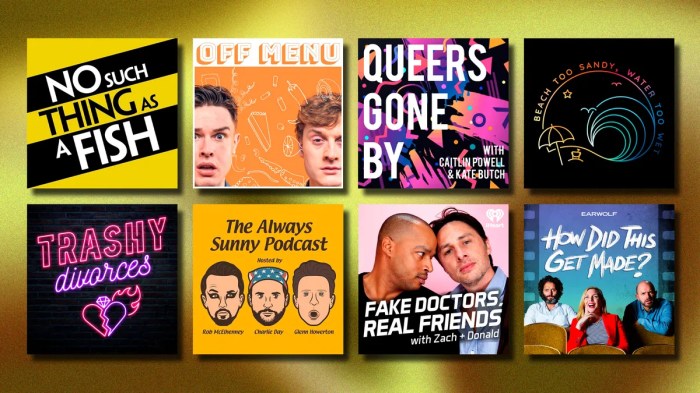
Ever wondered about the booming world of comedy podcasts? From their humble beginnings to their current reign as a major entertainment force, these audio shows have captured hearts (and earbuds) worldwide. We’ll explore the evolution of comedic podcasting, uncovering the secrets behind successful formats, and even predicting the future of laughs on demand! Get ready for a chuckle-filled journey!
This exploration delves into the diverse landscape of comedy podcasts, examining everything from their historical development and various subgenres to the crucial elements of production, marketing, and monetization. We’ll dissect successful formats, analyze different comedic styles, and even offer practical tips for aspiring podcast creators. Buckle up for a rollercoaster ride through the world of audio entertainment!
Popularity and Trends in Comedy Podcasts
The comedy podcast landscape has exploded over the past decade, transforming from a niche hobby to a mainstream entertainment force. This growth is fueled by increased accessibility through podcasting platforms, a desire for on-demand audio content, and the unique intimacy and creative freedom offered by the medium. This evolution has seen a diversification of styles, a broadening of audience demographics, and the emergence of new comedic voices and formats.
The evolution of comedy podcasts mirrors the broader evolution of podcasting itself. Initially, comedy podcasts were often a side project for established comedians or a platform for independent creators with limited resources. Early podcasts often relied on simple setups and relied heavily on the personalities of the hosts. The rise of sophisticated editing techniques, improved audio quality, and the growth of podcast networks have significantly impacted production values, leading to a more polished and professional product.
This has attracted both larger audiences and more established comedians, further driving the industry’s growth.
Popular Comedy Podcast Subgenres
The comedy podcast world is incredibly diverse. Several subgenres have emerged as particularly popular, each attracting its own dedicated audience. These categories aren’t mutually exclusive, and many podcasts blend elements from several subgenres.
Some of the most prominent include narrative comedy, where comedians tell fictional stories or build comedic universes; interview-based comedy podcasts, featuring conversations with interesting guests; sketch comedy podcasts, offering a series of short, comedic sketches; and true crime comedy podcasts, which blend dark humor with real-life crime stories. There’s also a substantial market for advice comedy, where hosts offer humorous takes on everyday problems, and topical comedy podcasts which use current events as their comedic fodder.
Comedy Podcast Audience Demographics
Audience demographics vary significantly depending on the style and content of the podcast. Narrative comedy podcasts, for example, often attract a broader audience, appealing to listeners who enjoy storytelling regardless of their specific sense of humor. Interview-based podcasts can attract a more niche audience based on the guests’ appeal. Sketch comedy podcasts tend to appeal to younger demographics, while true crime comedy podcasts may have a slightly older, more diverse audience.
For example, a podcast focusing on millennial experiences might attract a younger demographic, while a podcast reviewing classic films might appeal to an older, more established audience. This variation highlights the ability of the comedy podcast format to reach a wide range of listeners, catering to diverse tastes and preferences.
Significant Milestones in Comedy Podcasting History
Several key moments have shaped the comedy podcast landscape.
While pinpointing exact dates is difficult, a reasonable timeline might include the early 2000s as the period of nascent growth, with shows emerging alongside the early adoption of podcasting technology. The mid-2010s saw a significant surge in popularity, fueled by the rise of platforms like iTunes and Spotify, along with increased accessibility of recording and editing software. The late 2010s and early 2020s witnessed the rise of large podcast networks, offering production support and wider distribution, allowing for the creation of more polished and commercially successful shows.
The COVID-19 pandemic further accelerated the growth of the medium, as people sought out audio entertainment during lockdowns. This period also saw the increasing popularity of Patreon and other subscription models, allowing creators to directly monetize their work and build more engaged communities.
Successful Comedy Podcast Formats

Crafting a successful comedy podcast hinges on more than just funny jokes; it’s about finding the right format and execution to resonate with your audience. The format you choose dictates the structure, style, and overall feel of your show, influencing everything from listener engagement to production complexity. Choosing wisely is key to building a loyal following.
A successful comedy podcast format relies on a strong core concept, consistent execution, and a clear understanding of your target audience. This includes elements like a well-defined comedic voice, engaging content, and high-quality audio production. Furthermore, understanding the power of pacing, editing, and sound design can significantly amplify the comedic impact. Let’s explore some key aspects.
Key Elements of Successful Comedy Podcast Formats
Several factors contribute to a successful comedy podcast format. These go beyond simply having funny hosts; they involve strategic planning and execution. A strong comedic premise, clear narrative structure (where applicable), and consistent branding are vital. Crucially, the chosen format must be sustainable in the long term; a format relying on one-off gags will struggle to maintain audience interest compared to a format with more depth or recurring elements.
Examples of Successful Comedy Podcast Formats
The comedy podcast landscape boasts a diverse range of successful formats. Each appeals to a different audience and utilizes unique approaches to humor. Understanding these differences can inform your own podcast’s development.
- Interview-based: Podcasts like Comedy Bang! Bang! utilize a conversational interview format, often with unexpected guests and improvisational elements. The humor comes from the interplay between the host and guest, resulting in unpredictable and hilarious moments.
- Sketch Comedy: Shows like The Thrilling Adventure Hour showcase pre-written comedic sketches, offering a variety of characters and scenarios. This format allows for greater control over the comedic material but requires strong writing and skilled performers.
- Narrative: Podcasts like Welcome to Night Vale employ a narrative structure, using a fictional setting and characters to deliver comedic storytelling. This format allows for sustained humor and character development over multiple episodes, building a rich and engaging world for the listener.
- Panel/Roundtable: Podcasts like Doug Loves Movies bring together a group of comedians to discuss a specific topic, often with humorous tangents and debates. The dynamic between the panelists is crucial, creating spontaneous and engaging comedy.
The Importance of Audio Quality and Editing in Comedy Podcast Production
High-quality audio is paramount for a successful comedy podcast. Poor audio quality can distract listeners and diminish the comedic impact, regardless of how funny the content is. Careful editing is equally important, ensuring a smooth flow, removing any mistakes or awkward silences, and enhancing the comedic timing.
The Use of Sound Effects and Music to Enhance Comedic Effect
Sound effects and music can significantly enhance the comedic effect of a podcast. Strategic use of sound design can create atmosphere, emphasize punchlines, and add layers of humor that go beyond the spoken word. Music can be used to set the tone, transition between segments, and underscore specific comedic moments. Consider the use of comedic stings or sound effects that directly relate to the jokes being told.
For example, a cartoonish “boing” sound effect after a particularly silly statement can add an extra layer of humor.
The Role of Humor and Entertainment

Comedy podcasts thrive on their ability to entertain, and the type of humor employed is crucial to their success. A well-crafted comedic podcast understands its audience and uses humor strategically to engage listeners and create a memorable experience. This involves more than just telling jokes; it’s about building a comedic world, developing characters, and using humor to explore a wide range of themes.
Types of Humor in Successful Comedy Podcasts
Successful comedy podcasts utilize a diverse range of comedic techniques. They often blend several styles to create a unique and engaging listening experience. For example, “My Brother, My Brother and Me” relies heavily on absurdist humor and witty banter, while “The Read” masterfully incorporates observational humor and sharp social commentary. Podcasts like “Comedy Bang! Bang!” showcase a blend of improv, character work, and surreal humor.
The key is finding a consistent style that resonates with the target audience and allows for creative exploration.
Comedic Timing and Delivery Techniques
The art of comedic timing is paramount in podcasting. A well-placed pause, a perfectly delivered punchline, or the subtle inflection of a voice can transform a simple statement into a comedic goldmine. Techniques such as building anticipation through slow burns, using unexpected twists, and employing vocal variety (changes in tone, pace, and volume) are crucial. Consider the masterful pauses employed by Marc Maron in “WTF,” which build tension and allow the listener to fully appreciate the humor.
Similarly, the rapid-fire delivery and perfectly synchronized interruptions in shows like “Comedy Bang! Bang!” contribute significantly to their comedic impact.
Using Humor to Address Serious or Sensitive Topics
Humor can be a powerful tool for tackling sensitive subjects. By using satire, irony, or self-deprecating humor, comedians can create a space for open dialogue and understanding. Podcasts like “Call Your Girlfriend” utilize humor to discuss complex feminist issues, creating a lighthearted yet insightful conversation. The effectiveness lies in the balance—the humor shouldn’t trivialize the issue but rather provide a lens through which to examine it more critically and accessibly.
It’s about finding the humor in the absurdity of the situation, not making light of the suffering itself.
Comparison of Comedic Styles Across Podcasts
Let’s compare two contrasting styles: the observational humor of “The Joe Rogan Experience” versus the absurdist humor of “Welcome to Night Vale.” Rogan’s podcast relies on relatable anecdotes and commentary on current events, often employing self-deprecating humor and a conversational style. This approach is accessible and broadly appealing but can sometimes lack depth or originality. “Welcome to Night Vale,” on the other hand, uses surreal narratives and bizarre characters to explore themes of isolation and societal anxieties.
This approach is highly creative and unique but might alienate listeners who prefer more straightforward humor. Each style has its strengths and weaknesses, with success depending on the target audience and the podcast’s overall goals.
Monetization and Marketing Strategies for Comedy Podcasts
Launching a successful comedy podcast requires more than just hilarious jokes; it needs a robust marketing plan and a smart monetization strategy. This section explores various avenues for turning your comedic genius into a profitable venture, while also navigating the challenges and opportunities inherent in the podcasting landscape. We’ll delve into specific strategies, successful examples, and the complexities of podcast advertising.
Podcast Marketing Plan: A Blueprint for Success
A comprehensive marketing plan is crucial for gaining visibility and building a loyal audience. This plan should encompass several key areas, leveraging both online and offline strategies. A multi-pronged approach is key to reaching a wider audience and establishing a strong brand presence.
- Social Media Blitz: Utilize platforms like Twitter, Instagram, TikTok, and Facebook to engage with potential listeners. Share funny clips, behind-the-scenes content, and interact with your audience. Run targeted ads to reach specific demographics interested in comedy podcasts. Consider using relevant hashtags and engaging in conversations related to comedy and podcasting.
- Website and Email List: Create a website serving as a central hub for your podcast, including episode downloads, show notes, and contact information. Build an email list to directly communicate with listeners, announcing new episodes, promotions, and exclusive content.
- Cross-Promotion: Collaborate with other podcasts, particularly those in the comedy genre or with a similar target audience. Guest appearances on other shows and reciprocal promotions can significantly expand your reach.
- Public Relations: Reach out to relevant media outlets, bloggers, and podcast reviewers to secure coverage and reviews. A positive review can significantly boost your podcast’s visibility.
- Podcast Directories: Optimize your podcast listing on major platforms like Apple Podcasts, Spotify, Google Podcasts, and others. Use compelling descriptions and eye-catching artwork.
Monetization Models for Comedy Podcasts
Several effective monetization models exist for comedy podcasts, each with its own advantages and disadvantages. Choosing the right model (or a combination) depends on your audience size, content, and long-term goals.
- Sponsorships: This is a popular choice, involving securing sponsors who pay to have their ads read during your podcast. Finding sponsors who align with your brand and audience is essential for maintaining credibility and listener engagement. Rates vary depending on your audience size and engagement metrics.
- Subscriptions/Premium Content: Offer exclusive content, bonus episodes, or ad-free listening to paying subscribers through platforms like Patreon or Substack. This model fosters a stronger connection with dedicated fans willing to invest in your work.
- Affiliate Marketing: Promote products or services relevant to your audience and earn a commission on sales generated through your unique affiliate links. This requires careful selection of products that align with your brand and resonate with your listeners.
- Merchandise: Selling branded merchandise like t-shirts, mugs, or other items can provide an additional revenue stream, particularly if you’ve cultivated a strong and engaged fanbase.
Podcast Advertising: Challenges and Opportunities
Podcast advertising presents both challenges and exciting opportunities. Finding the right balance between advertising and maintaining listener engagement is crucial.
One significant challenge is ensuring ads don’t disrupt the listening experience. Listeners are more likely to tune out if ads are too frequent, intrusive, or irrelevant. Successful podcast advertising often involves integrating ads seamlessly into the show’s flow, making them feel natural and less disruptive. For example, a comedian might incorporate a sponsor’s product into a joke, making the advertisement feel more organic and entertaining.
Opportunities exist in targeted advertising, reaching specific demographics based on listener data. This allows for more effective ad placement, leading to higher conversion rates. Moreover, the intimate nature of podcast listening fosters a stronger connection between listeners and advertisers, potentially leading to higher brand recall and loyalty.
Examples of Successful Marketing Campaigns
Several comedy podcasts have implemented highly effective marketing strategies. “My Brother, My Brother and Me” (MBMBaM) effectively utilizes social media, particularly Twitter, to engage directly with their audience and build a strong community. Their humor and consistent engagement have resulted in a massive and loyal following. Similarly, “Comedy Bang! Bang!” successfully leveraged cross-promotion and guest appearances to expand their reach and build brand recognition within the comedy podcasting community.
Their consistent high-quality content and strategic marketing have established them as a leader in the genre.
The Future of Comedy Podcasting
The world of comedy podcasting is a dynamic landscape, constantly evolving with technological advancements and shifting audience preferences. Predicting its future requires considering not only the exciting possibilities but also the potential pitfalls that lie ahead. The next five to ten years promise significant changes, reshaping how comedians connect with their audiences and how the industry itself operates.
Technological Advancements and Their Impact
Technological advancements will play a crucial role in shaping the future of comedy podcasting. AI-powered tools are already being used for audio editing and even script generation, though their creative application remains a developing field. We can anticipate more sophisticated AI tools assisting in content creation, potentially leading to personalized comedy experiences tailored to individual listener preferences. Imagine a podcast that dynamically adjusts its jokes and pacing based on real-time listener feedback through integrated sensors.
This level of personalization could lead to higher engagement rates and a more immersive listening experience. Furthermore, advancements in virtual and augmented reality could create entirely new formats, blurring the lines between podcast listening and interactive entertainment. Consider a comedy podcast where listeners become active participants in the narrative, choosing dialogue options or influencing the story’s direction through voice commands or haptic feedback.
Challenges and Opportunities in the Next Five Years
The next five years will present both challenges and opportunities. A major challenge will be maintaining audience engagement in a saturated market. The sheer volume of podcasts available necessitates innovative approaches to stand out. Opportunities lie in exploring new monetization models beyond traditional advertising. Subscription services, merchandise sales, and live events integrated with podcast content offer promising avenues for revenue generation.
Another significant challenge will be adapting to evolving platform algorithms. Podcasts rely heavily on algorithms for discoverability, and changes in these algorithms can significantly impact a podcast’s reach. The opportunity here lies in understanding and proactively adapting to these algorithm shifts, using data analytics to optimize content and distribution strategies. For example, a podcast might experiment with shorter, more easily digestible episodes to better suit the consumption habits indicated by algorithm data.
Impact of Changing Audience Preferences
Audience preferences are in constant flux. Younger generations are increasingly drawn to diverse and inclusive voices, demanding representation across different backgrounds and perspectives. Comedy podcasts that fail to reflect this changing demographic landscape risk losing a significant portion of their potential audience. This shift creates an opportunity for comedians to embrace diverse storytelling and explore new comedic styles, creating content that resonates with a broader and more inclusive audience.
For example, podcasts focusing on niche interests or employing unique comedic styles (like absurdist humor or dark comedy) are likely to find a dedicated audience.
Hypothetical Scenario: Comedy Podcasting in 10 Years
In ten years, the landscape of comedy podcasting will be dramatically different. Imagine a world where AI-powered personalized comedy podcasts are commonplace, offering tailored jokes and storylines based on individual listener profiles. These podcasts might even incorporate interactive elements, allowing listeners to influence the narrative or interact directly with the comedians through virtual reality. Monetization will likely be diversified, with subscription models and integrated e-commerce becoming the norm.
Furthermore, the lines between podcasting and other forms of entertainment, such as live streaming and video games, will blur. A successful comedy podcast might not only feature audio content but also integrate live virtual performances, interactive games, and personalized merchandise, creating a holistic entertainment ecosystem centered around the comedic brand. The competitive landscape will remain intense, but the opportunities for innovation and audience engagement will be unparalleled.
Creating Engaging Podcast Content
Crafting a truly captivating comedy podcast requires more than just a few funny jokes; it demands a strategic approach to content creation and audience engagement. The key is to consistently deliver fresh, relatable, and hilarious material that keeps listeners coming back for more. This involves thoughtful planning, strong writing, and a genuine connection with your audience.
Creative Podcast Episode Ideas
Generating innovative episode ideas is crucial for maintaining listener interest. Think outside the box! Instead of relying solely on stand-up routines, explore diverse formats. One approach is to create recurring segments, like a weekly “news in review” section with a comedic twist, or a character-driven narrative that unfolds over multiple episodes. Another avenue is to incorporate listener participation, such as asking for funny anecdotes or answering questions submitted via social media.
Collaborations with other comedians or experts in specific fields can also inject fresh perspectives and attract new audiences. Finally, consider exploring topical humor, tying your jokes to current events (while being mindful of sensitivity), or creating fictional scenarios based on universal experiences.
Building Audience Engagement and Interaction
A successful comedy podcast thrives on interaction. Regularly engaging with your audience fosters a sense of community and encourages repeat listens. Methods include hosting live Q&A sessions, encouraging social media interaction through polls and challenges, and incorporating listener-submitted content directly into the podcast. Running contests or giveaways can also boost engagement. Responding personally to comments and messages demonstrates appreciation for your audience’s support.
Creating a dedicated online community, such as a Discord server or Facebook group, provides a space for listeners to connect with each other and the podcast hosts, further strengthening the bond.
The Importance of Strong Writing and Storytelling in Comedy Podcasts
Strong writing and storytelling are the backbone of any successful comedy podcast. Jokes need to be well-crafted, punchlines sharp, and the overall narrative engaging. A well-structured episode flows smoothly, moving from one comedic element to the next without feeling disjointed. Think of your podcast like a short story with a beginning, middle, and end, even if it’s a collection of loosely connected jokes.
Effective storytelling can elevate even the simplest jokes by adding context, character, and emotional depth. Consider using narrative techniques such as foreshadowing, cliffhangers, and character development to create a compelling listening experience.
Sample Episode: “The Case of the Missing Microphone”
This episode follows a fictional detective duo, “Detective Dave” and “Sergeant Sally,” as they investigate the mysterious disappearance of a crucial podcast microphone.
| Segment | Topic | Comedic Effect |
|---|---|---|
| Introduction | The missing microphone is discovered; the detectives are introduced. | Establish quirky personalities and set the comedic tone. |
| Clues and Suspects | The detectives examine clues (a misplaced coffee cup, a suspicious-looking intern). | Physical comedy and slapstick humor through exaggerated reactions and misinterpretations. |
| Interrogation | The detectives interrogate a series of absurd suspects, each with a unique comedic quirk. | Wordplay, dry humor, and unexpected twists in the questioning. |
| Resolution | The mystery is solved (perhaps the microphone was accidentally swallowed by a pet hamster). | Absurdist humor and a satisfying, yet unexpected, conclusion. |
Comedy Podcast Production and Technology
Producing a high-quality comedy podcast doesn’t require a Hollywood budget, but understanding the essential equipment and software is crucial for achieving professional-sounding results. From initial recording to final mastering, the technical aspects play a significant role in shaping the listener’s experience and ultimately, the success of your show. Let’s delve into the nuts and bolts of comedy podcast production.
Necessary Equipment and Software
Creating a polished comedy podcast involves a strategic selection of tools. High-quality audio is paramount; a poor recording will severely impact even the funniest material. The minimum requirements include a good microphone, headphones, and audio editing software. Beyond the basics, additional equipment can enhance your production value.
- Microphone: A dynamic microphone (like the Shure SM7B or Electro-Voice RE20) is ideal for rejecting background noise, perfect for home studio setups. Condenser microphones (like the Rode NT1-A) offer greater sensitivity but require a quieter recording environment.
- Headphones: Closed-back headphones are essential to monitor your audio without bleed-through into the recording. They prevent audio feedback loops and allow for precise monitoring of levels.
- Pop Filter: This prevents plosives (harsh ‘p’ and ‘b’ sounds) from distorting your audio. It’s a relatively inexpensive but crucial accessory.
- Audio Interface (Optional but Recommended): An audio interface improves audio quality by providing a cleaner signal path and often includes pre-amps for better microphone gain.
- Computer: A reasonably powerful computer is needed to handle audio editing software. Sufficient RAM and processing power will prevent lag and crashes during editing.
- Audio Editing Software: Popular options include Audacity (free and open-source), GarageBand (free for macOS), Adobe Audition (subscription-based), and Reaper (affordable and powerful).
Recording, Editing, and Mastering a Comedy Podcast Episode
The production process follows a clear sequence: recording, editing, and mastering. Each stage contributes to the final product’s quality.
- Recording: Ensure a quiet recording environment, test your microphone and levels beforehand, and maintain consistent distance from the microphone throughout the recording. Multiple takes are recommended to allow for selection of the best performance.
- Editing: This involves removing mistakes, unwanted sounds (like coughs or background noise), and adjusting audio levels. Editing software allows for precise manipulation of the audio waveform, enabling the creation of a polished and professional-sounding episode.
- Mastering: This is the final stage where the audio is optimized for various platforms. Mastering involves equalizing the audio, compressing the dynamics, and adding a limiter to ensure consistent loudness across the entire episode. While mastering can be done yourself, outsourcing to a professional mastering engineer can yield superior results.
The Role of Audio Editing Techniques in Enhancing Comedic Impact
Audio editing isn’t just about cleaning up mistakes; it’s a powerful tool for enhancing comedic effect.
- Sound Effects: Strategically placed sound effects can amplify jokes and create a richer listening experience. A well-timed sound effect can enhance the impact of a punchline or build anticipation.
- Music and Jingle: A catchy intro/outro jingle or background music can establish the show’s brand identity and create a memorable listening experience. Music can also be used to transition between segments or emphasize specific moments.
- Audio Compression and Equalization: These techniques can make the audio sound fuller and more professional, ensuring that jokes are clear and easily understood. Proper compression and equalization can help maintain a consistent level of loudness.
- Adding Emphasis: Slight increases in volume or the addition of reverb can be used to emphasize certain words or phrases, enhancing the comedic timing and delivery.
Resources for Aspiring Comedy Podcast Creators
Numerous resources are available to support aspiring podcasters.
- Online Tutorials and Courses: Platforms like YouTube, Skillshare, and Udemy offer many free and paid courses covering podcasting techniques.
- Podcast Communities and Forums: Connect with other podcasters online to share tips, ask questions, and get feedback.
- Audio Engineering Books and Manuals: These provide in-depth knowledge about audio recording, editing, and mastering techniques.
- Software Documentation and Support: Familiarize yourself with the documentation and support resources for your chosen audio editing software.
Final Summary
So, there you have it – a whirlwind tour of the captivating world of comedy podcasts! From the rise of stand-up specials to the evolution of sketch comedy and beyond, the journey has been nothing short of hilarious. As we look to the future, the possibilities are endless, promising even more laughter, innovation, and creative expression in this dynamic audio landscape.
Get ready for more laughs – the best is yet to come!
Helpful Answers
How much does it cost to start a comedy podcast?
Surprisingly little! You can start with free recording software and a decent microphone. Costs increase with professional editing and marketing.
How do I find my comedic niche?
Think about your unique perspective and what makes you laugh. What topics are you passionate about? Experiment with different styles until you find your voice.
How can I promote my comedy podcast?
Utilize social media, engage with other podcasters, cross-promote, and consider paid advertising on podcast platforms.
What are some popular podcast hosting platforms?
Libsyn, Buzzsprout, Anchor, and Podbean are popular choices, each offering various features and pricing plans.





